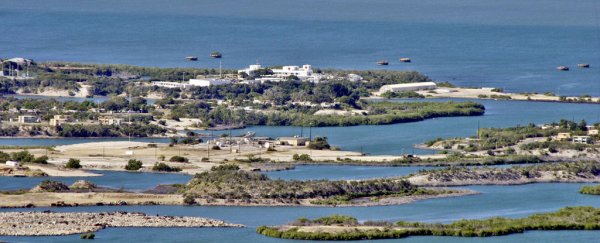Last month, President Obama gave new details on a longstanding commitment to shut down the notorious Guantanamo Bay detention camp, despite strong criticism of the trouble and cost of resettling the prison's current detainees.
But there's another question closer to the heart of some scientists: once the facility is closed, what becomes of the environment in which it's based? Researcher Joe Roman, a conservation biologist at the University of Vermont, has an answer for this, proposing that the naval base be transformed into a marine research centre and international peace park.
"Guantánamo could become the Woods Hole of the Caribbean," said Roman, in reference to a prestigious ocean institute in Massachusetts. "This could be a powerful way for the Obama administration to achieve the president's 2008 campaign promise to close the prison — while protecting a de facto nature reserve and some of the most important coral reefs in the world."
Outlining the proposal in a commentary published in Science, Roman and James Kraska, professor of law at the US Naval War College, suggest that a research facility jointly run by the US and Cuba could unite the two nations, while "helping meet the challenges of climate change, mass extinction and declining coral reefs".
Roman says that the decades of political and economic division between the US and Cuba have resulted in the latter's coastlines becoming a kind of "accidental Eden", featuring pristine mangrove wetlands, seagrass beds, and tropical forests ripe for scientific study. Bolstered further by Cuba's conservation efforts in recent times, the biologist suggests the country's coral reefs, fish diversity, and marine life are "unparalleled in the Caribbean".
Aside from scientific goals, the proposed research centre could also conveniently solve political problems, Roman and Kraska suggest.
"The Obama administration has made it clear that diplomatic relations with Cuba and the transfer of detainees do not mean that it is willing to discuss the return of the Guantánamo base to Cuba anytime soon," they write. However, a jointly administered science facility might offer a neutral path forward in both nations' interest.
Then there's the environment to consider. Apart from studying the rich marine life currently in residence, a sustainability-focused research future for the territory would prevent an influx of US tourism dollars and business investment threatening the natural habitat as relations with Cuba thaw.
It's a bold proposal and there's no guarantee the US government will want to pursue it, but we hope it's something they'll consider seriously.
"With a reduced US footprint at Guantanamo, most of the land and sea could be given to threatened Cuban manatees and hawksbill sea turtles," Roman and Kraska write. "For the next generation, the name Guantanamo could become associated with redemption and efforts to preserve and repair the environment and international relationships."
